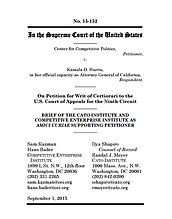Center for Competitive Politics v. Harris
Learn more about Cato’s Amicus Briefs Program.
Since the Enlightenment, anonymous speech has been an integral component of social change, exemplified by Cato’s Letters, the Federalist Papers, and indeed the Anti-Federalist Papers. Accordingly, the Constitution provides a wide berth for the proper “breathing space” that “First Amendment freedoms need … to survive” by protecting anonymous-speech rights and requiring judges to be skeptical regarding laws that compel disclosure of identifying information. California’s attorney general, however, has broken with this tradition in demanding that the Center for Competitive Politics (CCP), an educational foundation and public-interest law firm specializing in the First Amendment and political law, disclose its principal donors to the state. The federal district court determined that the demand for this information in the name of “investigative efficiency” was a valid use of state power, and the U.S. Court of Appeals for the Ninth Circuit affirmed that ruling. Importantly, this rule applies to all nonprofit organizations soliciting donations or otherwise operating in California, so the associational chill reaches into the ability of every nonprofit to exist in California while preserving privacy through anonymity. Cato, joined by the Competitive Enterprise Institute, has filed a brief supporting CCP’s request that the Supreme Court review the case. The Ninth Circuit failed to give proper solicitude to CCP’s constitutional rights here by not applying what lawyers call “heightened scrutiny” at each turn of its analysis. Instead, the lower court applied a party-specific, “as-applied” exception to the general rule that’s only relevant if the compelled disclosure has already survived a broader, “facial” challenge—and it collapsed the clear distinction between the importance of the government interest in disclosure and the extent of the nexus between the disclosure and the asserted interest. The court also missed the implications of its decision; not only is the NAACP subject to this disclosure regime—the very organization whose resistance to compelled disclosure culminated in the landmark case of NAACP v. Alabama (1958), which protects the right to anonymous association—but the largest, richest, and most politically active state now has this blanket disclosure regime, chilling First Amendment freedoms. The Supreme Court, from NAACP to Citizens United (2010), has required heightened scrutiny in compelled-disclosure cases—“a substantial relation between the disclosure requirement and a sufficiently important governmental interest.” And it has long “recognized that significant encroachments on First Amendment rights of the sort that compelled disclosure imposes cannot be justified by a mere showing of some legitimate governmental interest,” Buckley v. Valeo (1976), which is exactly what the Ninth Circuit accepted by collapsing the distinction between interests and nexus. Additionally, the Supreme Court’s recent Fourth Amendment decision in Los Angeles v. Patel (2015) requires reexamining the attorney general’s demand—which constitutes an administrative subpoena under California law—because “in order for an administrative search to be constitutional, the subject of the search must be afforded an opportunity to obtain precompliance review before a neutral decision maker.” In short, CCP v. Harris is wrong on many levels and cries out for Supreme Court review.



